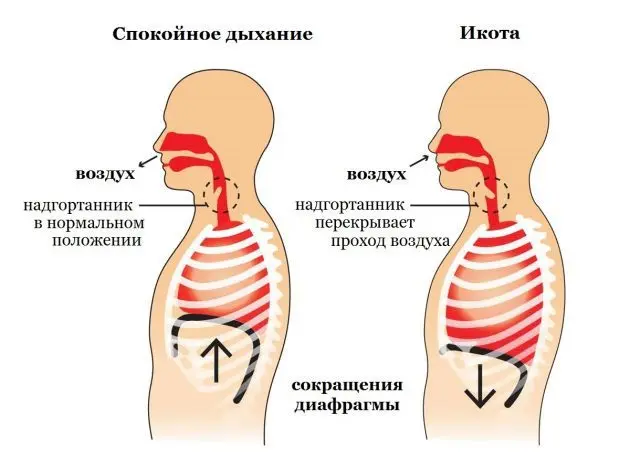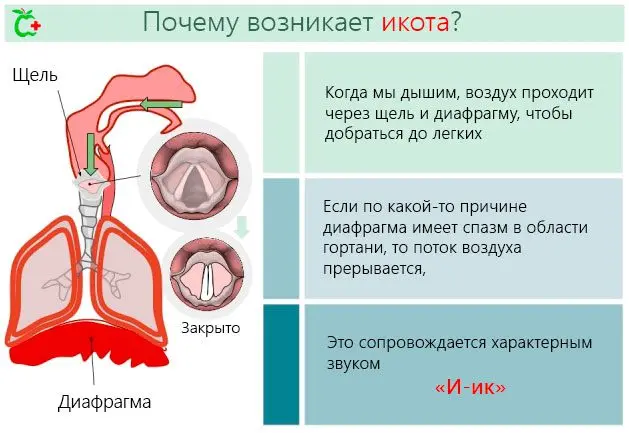Contents

Hiccups is a reflex reaction of the body, which occurs as a result of the influence of a wide variety of factors on the body. In most cases, it is not dangerous and goes away on its own after a short period of time. However, sometimes hiccups are a symptom of certain diseases, and can last quite a long time, exhausting a person.
It is impossible to control hiccups by willpower. It leads to short-term respiratory failure. During hiccups, a person takes a spontaneous breath, as the diaphragm and the muscles located between the ribs contract. In this case, air does not enter the lungs, since the respiratory organs are blocked by the epiglottis. With hiccups, a person has a kind of shortness of breath.
Hiccups and some facts about her

Most scientists are of the opinion that hiccups are a reflex reaction of the body, which is needed exclusively by the fetus, while it is in the mother’s womb. Thanks to hiccups, the amniotic fluid moves through the respiratory organs of the child. When he is born, the need for this reflex disappears. However, it persists and occurs in response to irritating factors.
Science knows cases when hiccups in people continued for several years and even decades. There is a man in the UK who has been hiccuping for 22 years. During the examinations, he was diagnosed with a brain tumor, but this fact did not explain such a prolonged hiccups. It’s hard to imagine, but there was a man in the world who suffered from hiccups for 68 years. On average, he hiccupped 15-40 times per minute (about 400 million times in 68 years).
Hiccups can be contagious. In the Arkhangelsk region in the village of Pinega, many women suffer from hiccups. According to scientists, they simply infect each other. They were even nicknamed “Pinezhsky hiccups.”
Hiccups is a topic that has become the basis for writing a huge number of scientific papers and books. There are various conspiracies against her. Even psychics and sorcerers are engaged in getting rid of hiccups.
How does hiccups develop?
The mechanism of hiccups can be understood by studying the process of human breathing.
Mechanisms of respiration
When a person takes a breath, his diaphragmatic and intercostal muscles contract. In this case, the air flow passes through the oral and nasal cavities, entering the larynx, trachea, bronchi and their small branches – the alveoli.
During inhalation, the diaphragmatic muscles tighten, and the sternum and chest rises. There is a pressure drop and air enters the lungs. When the muscles relax, the air leaves them.
When a person swallows, the airway is blocked by the epiglottis. This mechanism provides protection to the respiratory organs from food particles penetrating into them. Due to which they fall down the digestive tract without clogging the trachea and bronchi.

The vocal cords are located in the larynx. They close during a conversation, due to which a person makes a sound.
The nervous system is responsible for the movement of the respiratory muscles. The respiratory center is located in the medulla oblongata. Normally, it works automatically.
The brain receives signals that a large amount of carbon dioxide has accumulated in the body and the blood needs to release it. He gives a command to the respiratory muscles and it contracts, so the person takes a breath. When the lungs fill and expand sufficiently, the vagus nerve sends a signal to the respiratory center, causing the person to exhale.
The same vagus nerve is involved in the process of hiccups. It departs from the brain and is responsible for various functions. Thanks to the vagus nerve, a person’s heart beats, the vessels maintain the tone they need. If necessary, it causes a person to cough, and also provides mechanisms for the occurrence of vomiting. The vagus nerve controls the digestion of food. If he is irritated, the person begins to hiccup.
Hiccup Development Mechanisms
A variety of factors can cause irritation of the vagus nerve.
This includes:
Eating large amounts of food.
Alcohol abuse.
Hypothermia, etc.
The irritated nerve sends impulses to the brain, which also reach the spinal cord. The CNS causes the respiratory muscles to contract. In this case, the respiratory center for some time is not able to control the work of the diaphragm and intercostal muscles. They begin to contract like convulsions. At the same time, the epiglottis closes the airways, and the vocal cords close.
A person takes a breath, but the air does not penetrate into the lungs, as they are blocked by the epiglottis. The air current hits the vocal cords, so the person makes the sound characteristic of hiccups. Thus, the mechanism for the occurrence of hiccups is realized.

When the vagus nerve calms down, there is an increase in the concentration of carbon dioxide in the blood. The respiratory center again gets the opportunity to control the work of the diaphragm and intercostal muscles. Breathing stabilizes, hiccups disappear. If the factor that led to irritation of the vagus nerve has not been eliminated, then the hiccups will continue.
The main reasons that can provoke irritation of the vagus nerve include:
Violations of the nervous system.
Violations in the work of the digestive tract.
Irritation of the larynx and pharynx.
Inflammatory processes in the pleura and lungs.
Applying mechanical pressure to the vagus nerve.
Violations in the work of cardiac activity.
Hiccups are the result of irritation of the vagus nerve. It can indicate both banal causes and be a symptom of a violation in the work of internal organs.
Video: program “About the most important thing” – hiccups:









